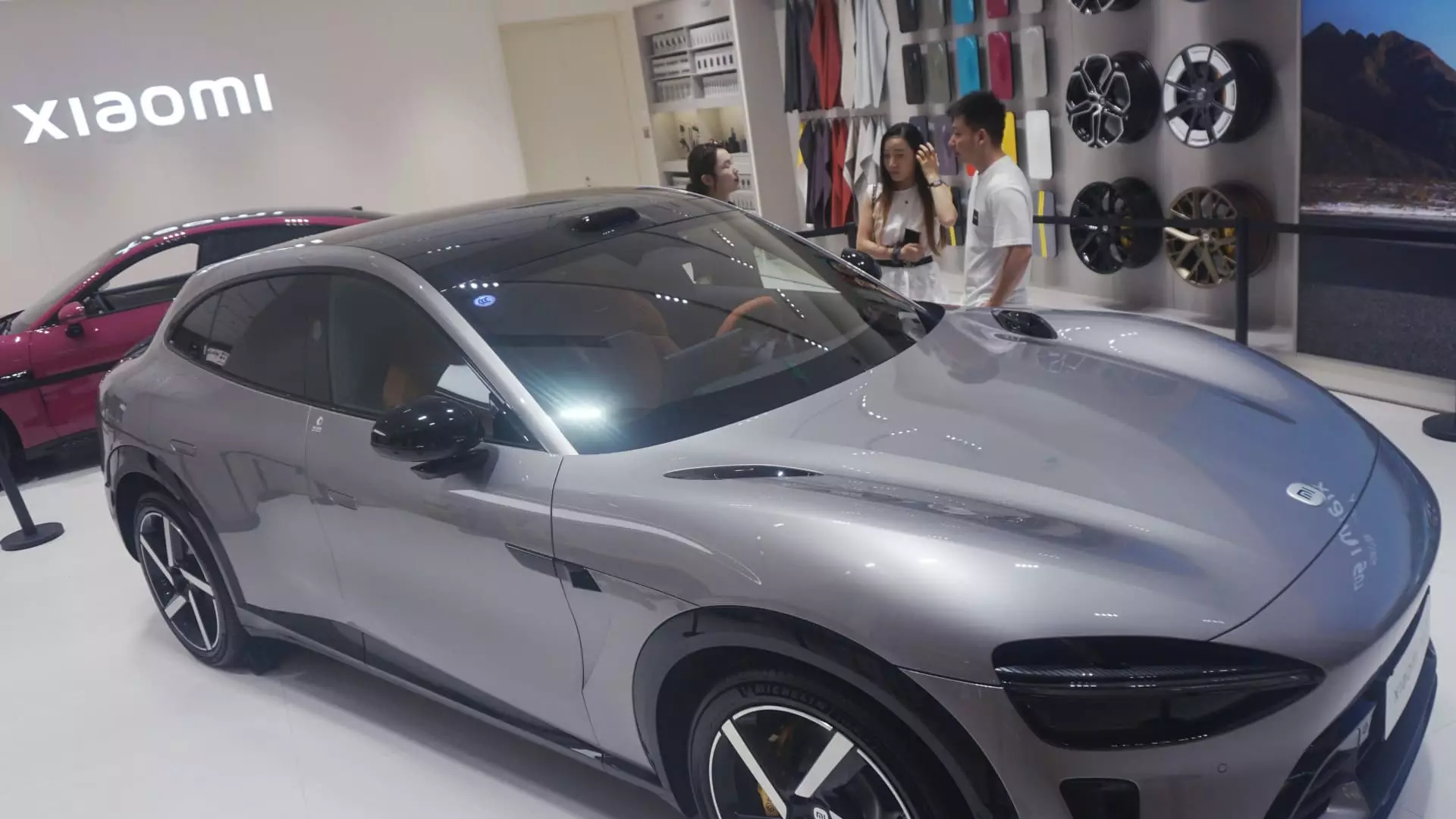Xiaomi, long recognized as a technology powerhouse in smartphones and home electronics, is making a striking statement in the electric vehicle (EV) arena. With its latest launch—the luxury electric SUV YU7—Xiaomi is not merely dipping a toe into the EV industry but diving in headfirst with a product aiming squarely at Tesla’s dominance. The YU7 debuted with an impressive surge in demand, securing over 200,000 orders within minutes, a clear indicator that Xiaomi’s strategy to disrupt the market might be succeeding. Such a strong reception showcases Xiaomi’s capability to leverage its loyal customer base built over years through its consumer electronics offerings.
The pricing strategy behind the YU7 is particularly noteworthy. At 253,500 yuan (about $35,300), Xiaomi undercuts Tesla’s Model Y by approximately 10,000 yuan, positioning itself as a more affordable yet competitive alternative. This aggressive pricing, coupled with the promising specifications, hints at a deliberate effort to make electric luxury vehicles more accessible in the rapidly growing Chinese market. It reflects Xiaomi’s experience in optimizing costs and scaling production efficiently from its history in consumer tech. This pricing challenge to Tesla will undoubtedly intensify the ongoing price war in the electric vehicle industry, forcing competitors to innovate and rethink their market tactics.
Technological Ambitions Beyond Price
While affordability sparks initial interest, Xiaomi is also placing emphasis on technological prowess. The YU7 boasts an impressive driving range of at least 760 kilometers (472 miles) per charge, surpassing Tesla’s extended-range Model Y. In electric vehicles, range anxiety remains a significant consumer concern, and Xiaomi’s claim of exceeding Tesla’s benchmark directly addresses this pain point. However, Xiaomi candidly admits that although the YU7 outperforms in many aspects, its driver-assist features still lag behind Tesla’s more advanced Autopilot system. The vehicle incorporates Nvidia’s Thor chip to power its driver-assist software, signaling Xiaomi’s commitment to integrating cutting-edge hardware and AI, albeit with room to grow.
Interestingly, the launch also spotlighted several innovative AI-driven functionalities, such as gesture controls for music and smart parking location reminders via a smartphone app. These features demonstrate Xiaomi’s unique strength in software integration from its smartphone and IoT ecosystems, creating a holistic user experience that blends automotive and digital lifestyles. The support for Apple CarPlay and Apple Music is another smart move, reflecting Xiaomi’s awareness of the global consumer’s expectations for infotainment interoperability.
Expanding AI Innovations: The AI Glasses
Xiaomi’s ambitions reach far beyond cars. Alongside the YU7 launch, the company introduced AI-powered smart glasses, signaling its intent to innovate in wearable technology. Priced at an accessible 1,999 yuan ($279), these glasses mimic functionalities offered by high-profile competitors like Meta’s Ray-Bans. Key features include dynamic lens tinting, QR code scanning for payments—a crucial function in mobile-first China—and AI capabilities like real-time translation and object recognition. This approach underscores Xiaomi’s philosophy of combining practicality with cutting-edge technology, ensuring devices cater to everyday consumer habits while introducing futuristic utility.
Notably, Xiaomi currently has no plans to release these glasses internationally, a cautious but understandable stance given the fierce competition and regulatory hurdles in global wearables markets. Meanwhile, Meta’s version faces restrictions in China, giving Xiaomi a significant home-ground advantage. This localized focus could help Xiaomi refine its products before attempting global expansion, a strategy that has served the company well in the past.
Strategic Positioning and Market Implications
Xiaomi’s rapid and multi-pronged push into electric vehicles and AI devices marks a compelling turning point. The company is showcasing that its strengths in affordable innovation, consumer loyalty, and software ecosystem integration can be translated into new markets challenging established giants like Tesla and Meta. However, Xiaomi remains a relative newcomer in the automotive industry, a sector fraught with capital intensity, regulatory scrutiny, and complex manufacturing demands that differ greatly from mobile devices.
Success in this new domain will require Xiaomi to maintain quality and reliability while scaling production to meet surging demands. The early enthusiasm and record-breaking pre-orders bode well, but the road ahead remains challenging. Balancing competitive pricing with technological innovation and expanding the AI-feature portfolio will be critical to Xiaomi’s longer-term EV strategy.
In sum, Xiaomi’s ascendance into the EV and AI spaces is not a mere extension of its product range but a bold challenge to industry leaders. Its focus on affordability, advanced technology, and consumer-centric features reflects a strategy that could reshape mobility and wearable tech in China and potentially beyond. The electric vehicle race and AI innovation arenas are becoming more contested, and Xiaomi’s entry elevates the stakes for all players involved.

